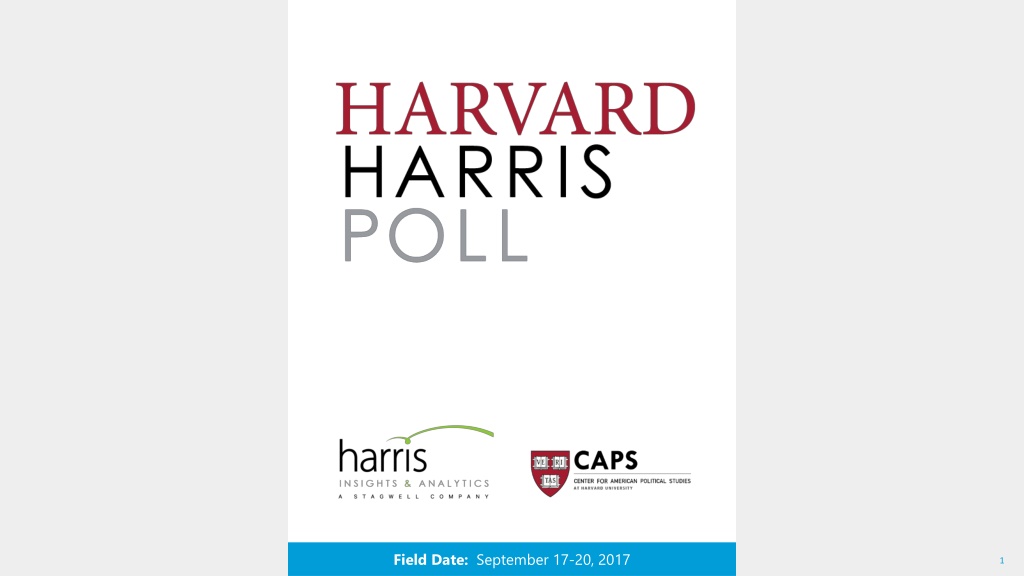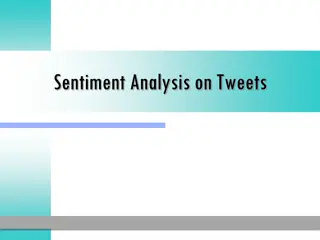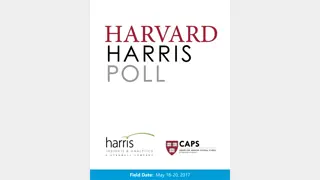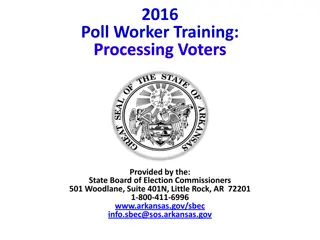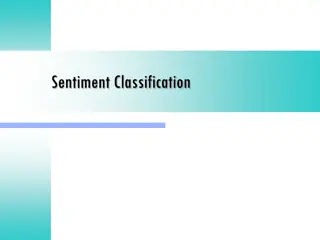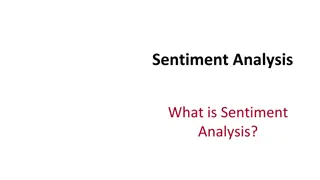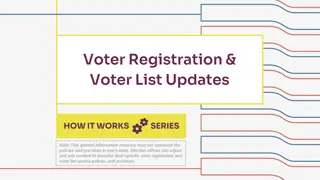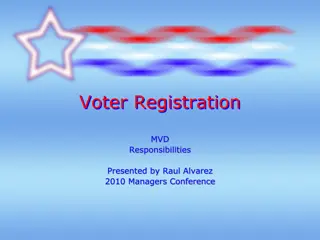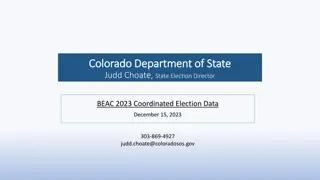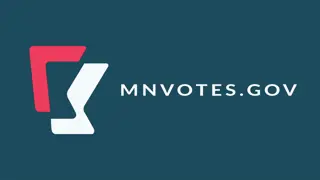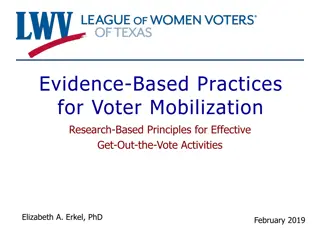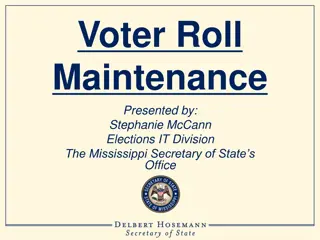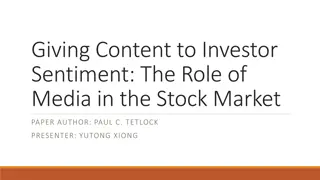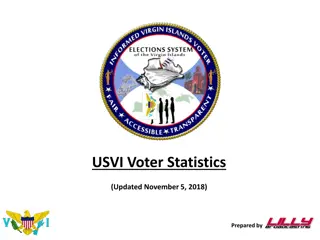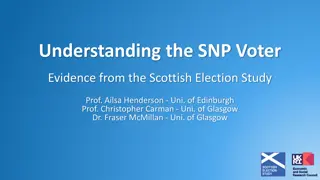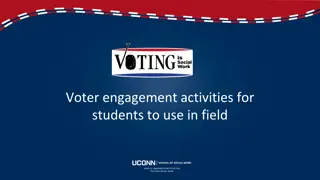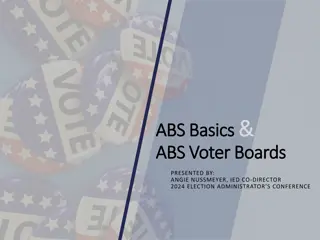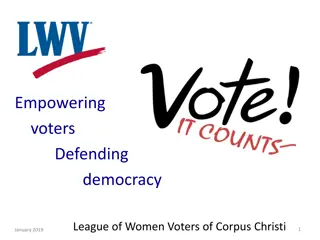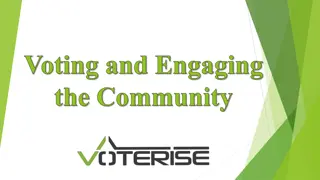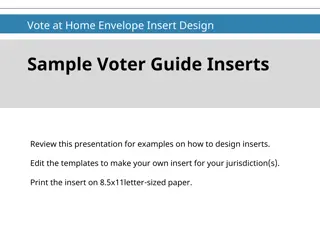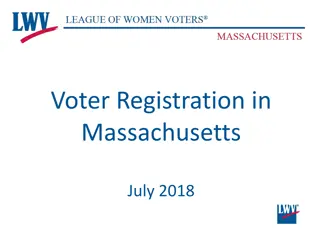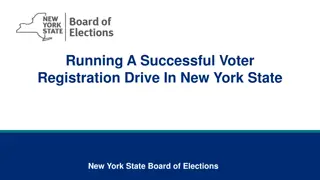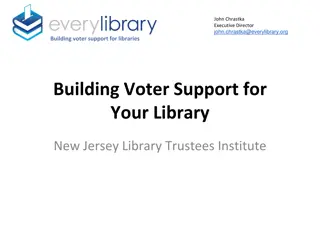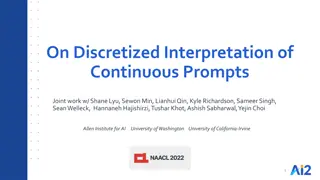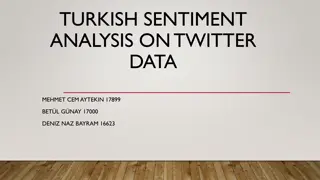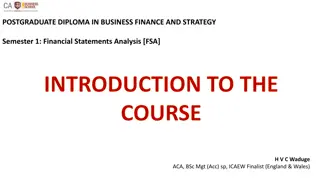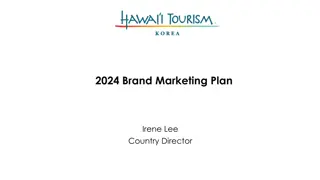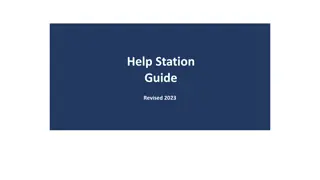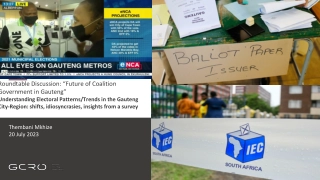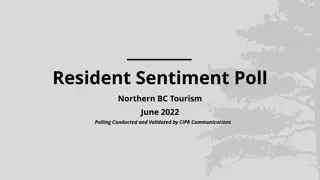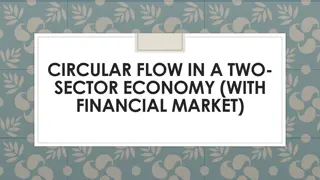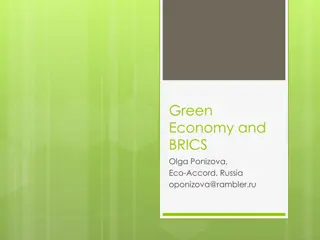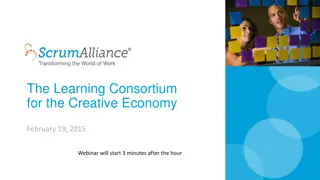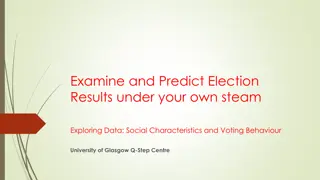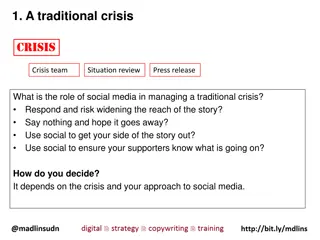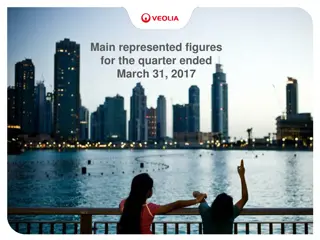Voter Sentiment Analysis on Economy and Financial Situations in September 2017
Voter sentiment regarding the direction of the country, the economy, and personal financial situations in September 2017 was analyzed through a survey conducted online among 2,177 registered voters. Results show that voters are more optimistic about the economy than the overall country with a majority seeing their financial situation as steady or improving.
Download Presentation

Please find below an Image/Link to download the presentation.
The content on the website is provided AS IS for your information and personal use only. It may not be sold, licensed, or shared on other websites without obtaining consent from the author. Download presentation by click this link. If you encounter any issues during the download, it is possible that the publisher has removed the file from their server.
E N D
Presentation Transcript
SURVEY METHOD Results were weighted for age within gender, region, race/ethnicity, marital status, household size, income, employment, education, political party, and political ideology where necessary to align them with their actual proportions in the population. Propensity score weighting was also used to adjust for respondents propensity to be online. This survey was conducted online within the United States between September 17-20, 2017 among 2,177 registered voters by The Harris Poll. Pollsters Mark Penn, Prof. Stephen Ansolabehere, and Dritan Nesho supervised the poll. 2
ECONOMY 3
VOTERS ARE CONSISTENTLY MORE OPTIMISTIC ABOUT THE DIRECTION OF THE ECONOMY THAN THE COUNTRY Only about 1 in 3 feel the country is on the right track. The Country The Economy Feb Mar Apr May Jun Jul Aug Sept Feb Mar Apr May Jun Jul Aug Sept Right Track 47% 46% 45% 44% 44% 43% 42% 41% 37% 36% 34% 34% 32% 32% 32% 30% 35% 35% 38% 38% 38% 38% 39% Wrong Track 41% 48% 50% 52% 53% 54% 54% 55% 59% BASE: Registered Voters (February n=2148; March n= 2092; April n=2027; May n=2006, June n=2258, July n=2032; August n=2263; September n=2177) M1.In general, do you think the country is on the right track or is it off on the wrong track? M2 In general, do you think the American economy is on right track or is it off on the wrong track? 4
FEWER THAN 2 IN 3 VOTERS TODAY SAY THE U.S. ECONOMY IS STRONG 1 in 10 categorizes the U.S. economy as very strong while over half say somewhat strong. Weak Strong Strength of the U.S. Economy Feb 39% 61% 7% 32% 50% 11% March 37% 63% 6% 31% 52% 11% Apr 39% 61% 7% 32% 52% 10% May 35% 65% 5% 29% 58% 7% June 5% 32% 53% 10% 37% 63% July 7% 30% 53% 9% 38% 62% 5% 29% 56% 11% Aug 34% 66% 5% 30% 53% 11% Sept 36% 64% Very weak Somewhat weak Somewhat strong Very strong BASE: Registered Voters (February n=2148; March n= 2092; April n=2027; May n=2006, June n=2258; July n= 2032;August n=2263; September n=2177) I3. How strong do you think the U.S. economy is today? 5
MAJORITY OF VOTERS SEE THEIR FINANCIAL SITUATION AS BEING STEADY OR IMPROVING One quarter of voters say it is improving, while more than a quarter say it is getting worse. Voters say their personal financial situation is Improving 25% Getting worse 28% Just as well off 38% No opinion 9% BASE: Registered Voters (n=2177) I4. Would you say that your personal financial situation is improving or getting worse? 6
MOOD OF THE COUNTRY 7
TRUMP APPROVAL RISING SLIGHTLY; REPUBLICANS CONTINUE TO STICK WITH THE PRESIDENT Over 2 in 5 registered voters say they have a favorable view of the President, while 45% approve of the job he is doing. Voters view of President Trump is Looking at the job President Trump is doing, voters approve 41% 41% 42% 43% favorable 44% 44% 45% 45% 43% 44% 45% 45% 48% 48% 48% 49% Those approving of President Trump are most often Republicans (84%) and Trump voters (90%). 53% 55% 55% 51% 51% 53% 50% 51% unfavorable 57% disapprove 56% 55% 55% 52% 51% 52% 52% Those most commonly disapproving are Democrats (86%), African Americans (89%) and Clinton voters (94%). no opinion/ never heard of 5% 5% 5% 5% 4% 4% 4% 4% BASE: Registered Voters (February n=2148; March n= 2092; April n=2027, May n=2006, June n=2258, July n=2032, August n=2263; September n=2177) M3. Do you approve or disapprove of the job Donald Trump is doing as President of the United States? F1. Now we will show you some names. Please indicate if you have a favorable or unfavorable view of that person - or if you've never heard of them. 8
OVER 6 IN 10 APPROVE OF THE JOB PRESIDENT TRUMP IS DOING DEALING WITH STORMS AND HURRICANES More than half also approve of the job President Trump is doing on fighting terrorism, stimulating jobs, and the economy. Disapprove Approve 35% 65% 20% 15% 33% 32% Dealing with storms and hurricanes 47% 53% 30% 17% 26% 28% Fighting terrorism 28% 19% 27% 26% 47% 53% Stimulating jobs 28% 20% 28% 24% 48% 52% The economy 42% 13% 22% 23% 55% 45% Immigration 41% 16% 26% 18% Administering the government 57% 43% 41% 16% 23% 20% Foreign affairs 57% 43% 0% 10% 20% 30% 40% 50% 60% 70% 80% 90% 100% BASE: Registered Voters (n=2177) M3A. Do you approve or disapprove of the job President Trump is doing on ? 9
JUST OVER 2 IN 5 VOTERS HAVE A FAVORABLE OPINION OF PRESIDENT TRUMP Nearly half of voters have an unfavorable opinion of McConnell and Ryan. Views of Political Figures Sanders 53% 11% 37% Sanders Pence 44% 15% 41% Pence Trump 43% 4% 53% Trump H. Clinton 39% 7% 55% H. Clinton Favorable 35% 33% 32% Warren Warren Unfavorable 31% 19% 49% Ryan Ryan Hayley 31% 51% 19% Hayley 31% 24% 46% Pelosi Pelosi 28% 45% 28% Tillerson Tillerson 27% 40% 33% Schumer Schumer Sessions 26% 33% 41% Sessions McConnell McConnell 19% 32% 49% Unknown/No Opinion BASE: Registered Voters (n=2177) F1 Now we will show you some names. Please indicate if you have a favorable or unfavorable view of that person - or if you've never heard of them. 10
BOTH PARTIES HAVE MAJORITY DISAPPROVAL RATINGS; REPUBLICAN RATINGS CONTINUE STEADY DECLINE September poll sees a slight rebound in approval rating for Republican party, and equal approval rating for Democratic party. Republican Party Job Approval Ratings Democratic Party Job Approval Ratings 7% Highest among: Republicans (59%) Trump voters (58%) 9% 8% 8% 8% 43% approve 10% 10% 10% 10% 10% 10% Highest among: Democrats (70%) Clinton voters (64%) African Americans (62%) 9% 10% 32% approve 11% 13% 14% 23% 25% 23% 27% 28% 31% 28% 28% 29% 32% 32% 30% 33% 33% 29% 29% 68% disapprove 30% 57% disapprove 28% 31% 27% 29% 28% 25% 28% 22% 24% 30% 28% 28% 28% 27% 31% Strongly approve Strongly approve 39% 40% 39% Somewhat approve 37% 35% 35% 36% 35% Somewhat approve 34% 34% 31% 31% 30% 30% 30% 26% Somewhat disapprove Somewhat disapprove Strongly disapprove Strongly disapprove Feb Mar Apr May Jun Jul Aug Sept Feb Mar Apr May Jun Jul Aug Sept BASE: Registered Voters (February n=2148; March n= 2092; April n=2027; May n=2006, June n=2,258, July n=2032, August n=2263; September n=2177) M4 Do you approve or disapprove of the way the Republican Party is handling its job? M5 Do you approve or disapprove of the way the Democratic Party is handling its job? 11
OVER ONE QUARTER OF VOTERS THINK STIMULATING AMERICAN JOBS SHOULD BE THE TOP PRIORITY FOR PRESIDENT TRUMP Fewer than 1 in 5 voters think that repealing and replacing the ACA should be the top priority. Voters think the top priorities for President Trump and Republicans in Congress should be Stimulating American jobs 27% Passing a comprehensive tax reform bill 16% Passing an infrastructure spending bill 14% Repealing and replacing the Affordable Care Act (also known as ''Obamacare'') 13% Destroying ISIS 13% Reducing the total amount of immigrants allowed in the United States 6% Renegotiating trade deals with other countries 4% Expanding family leave policies 4% Undoing the Iran deal 2% Building a wall between the United States and Mexico 2% BASE: Registered Voters (n=2177) M9. Which of the following should be the top priority for President Trump and Republicans in Congress? 12
MAJORITY OF VOTERS WOULD NOT IMPEACH TRUMP OVER HIS ACTIONS; MORE THAN 2 IN 5 DO NOT THINK ANY ACTION SHOULD BE TAKEN 2 in 5 think President Trump should be impeached and removed from office, while less than 1 in 5 say he should be censured by Congress. For his actions, President Trump should be 40% Impeached and removed from office No action should be taken 44% 16% Censured by Congress BASE: Registered Voters (n=2177) M9B. Do you think that, for his actions, President Trump should be impeached and removed from office, censured by Congress, or no action should be taken? 13
MORE THAN 2 IN 5 VOTERS SAY HEALTHCARE IS AMONG THE MOST IMPORTANT ISSUES FACING THE COUNTRY TODAY Nearly 2 in 5 say terrorism/national security, while about 3 in 10 say economy and jobs. Voters say the most important issues facing the country today are Healthcare 43% Terrorism/national security 37% Economy and jobs 29% Immigration 21% Race relations 21% National debt/ federal budget deficits 21% Environment/climate change 19% Taxes 16% Education 13% Corruption 12% Income inequality 11% Crime and drugs 11% Cybersecurity 10% Defense 9% Foreign policy 9% Criminal justice (policing, courts, prisons) 6% Political correctness 6% Women's rights 4% Other 2% BASE: Registered Voters (n=2177) I1. What would you say are the most important issues facing the country today? Please select three. 14
IMMIGRATION 15
MAJORITY OF VOTERS SAY LEGAL IMMIGRATION SHOULD BE KEPT AT THE SAME LEVEL AS IT IS TODAY Fewer than 1 in 5 feel it should increase, while close to 3 in 10 feel it should be decreased. Legal immigration to the U.S. should be 18% increased 54% kept at its current level 28% decreased BASE: Registered Voters (n=2177) DR1 Should legal immigration into the United States be kept at its present level, increased, or decreased? 16
BETWEEN 2 IN 3 AND 3 IN 4 VOTERS ARE IN FAVOR OF VARIOUS SOLUTIONS TO IMMIGRATION ISSUES Attitudes towards immigration solutions Comprehensive immigration reform from Congress to address border security and the 11 million undocumented immigrants living in the United States Congress providing a way for undocumented immigrants who are currently in the U.S. to gain legal citizenship if they learn English, pay fines or back taxes, and have jobs that pay taxes Work permits and a path to citizenship for people between 15-36 years of age brought to the U.S. illegally by their parents when they were children 23% Oppose 23% Oppose 32% Oppose 68% Favor 77% Favor 77% Favor BASE: Registered Voters (n=2177) DR2 Do you favor or oppose a comprehensive immigration reform from Congress to address border security and the 11 million undocumented immigrants living in the United States? DR3 Do you favor or oppose Congress providing a way for undocumented immigrants who are currently in the U.S. to gain legal citizenship if they learn English, pay fines or back taxes, and have jobs that pay taxes? DR4 Do you favor or oppose work permits and a path to citizenship for people between 15-36 years of age brought to the U.S. illegally by their parents when they were children? 17
A MAJORITY OF VOTERS FEELS THE ISSUE OF THE STATUS OF DREAMERS SHOULD BE DECIDED BY AN ACT OF CONGRESS The issue of the status of illegal immigrants brought to the U.S. by their parents when they were children should be decided by Presidential executive order 20% An act of Congress 80% BASE: Registered Voters (n=2177) DR5 Do you think the issue of the status of illegal immigrants who were brought to this country illegally by their parents when they were children should be decided by presidential executive order or an act of Congress? 18
VOTERS ARE EVENLY SPLIT ON WHETHER THEY SUPPORT OR OPPOSE PRESIDENT TRUMP S ANNOUNCEMENT TO END DACA On the Trump administration s recent announcement that in six months it will end DACA, which temporarily shelters Dreamers from deportation, pushing the issue back to Congress, voters say they 50% 50% Oppose Support BASE: Registered Voters (n=2177) DR6 The Trump administration recently announced that in six months it will end the Deferred Action for Childhood Arrivals (DACA) program, which temporarily shelters illegal immigrants who were brought to this country as children (so-called ''Dreamers'') from deportation, pushing the issue back to Congress. Do you support or oppose this move? 19
MAJORITY OF VOTERS SAY THE U.S. SHOULD BE ALLOWING THE SAME NUMBER OF LEGAL IMMIGRANTS EACH YEAR Fewer than 1 in 5 feel the U.S. should increase the amount, while 3 in 10 feel it should be decreased. The number of legal immigrants allowed into the country this year should be 16% increasing 54% keeping the same 30% decreasing BASE: Registered Voters (n=2177) DR7 Do you think we should be increasing, decreasing or keeping the same the number of legal immigrants allowed into this country each year? 20
TWO-THIRDS SAY IMMIGRATION PRIORITY SHOULD BE GIVEN TO THOSE WHO HAVE JOB SKILLS THE U.S. NEEDS Priority in immigration should be given to 33% People who have job skills the U.S. needs Relatives of people already here 67% BASE: Registered Voters (n=2177) DR8 Do you think that priority in immigration should be given to people with job skills the U.S. needs or to relatives of people already here? 21
OVER 7 IN 10 SAY CONGRESS SHOULD WORK TO RESTORE WORK PERMITS TO DREAMERS A slight majority says any restoration of work permits should be passed alone, as opposed to as part of a deal that increases border security. On work permits for those brought over illegally as children Any restoration of work permits should be 72% say Congress should work to restore work permits to those brought to the U.S. illegally as kids 47% Passed as part of a deal that increases border security 53% Passed alone 28% say Congress should let their rights end BASE: Registered Voters (n=2177) DR9 Should Congress act to restore work permits to those brought to the U.S. illegally as kids or should it let those rights end? DR10 Should any restoration of work permits for those brought to the U.S. as kids be passed alone or as part of a deal that increases border security? 22
MAJORITY OPPOSE THE PROPOSED CA LAW WHICH WOULD PROHIBIT COOPERATION WITH FEDERAL IMMIGRATION AUTHORITIES 7 in 10 voters say that, when someone is arrested for a crime, police should check their immigration status and cooperate with federal immigration authorities. On the California law under consideration that would prohibit state and local cooperation with federal immigration authorities in most instances, voters When someone is arrested for a crime, state or local police should 43% favor 57% oppose be prohibited from asking about immigration status and cooperating with federal authorities check the arrested person's immigration status and cooperate with federal immigration authorities 30% 70% BASE: Registered Voters (n=2177) DR11 Do you favor or oppose the California law under consideration that would prohibit state and local cooperation with federal immigration authorities in most instances? DR12 When state or local police arrest someone for a crime, should they check their immigration status and cooperate with federal immigration authorities or should they be prohibited from asking about immigration status and cooperating with federal authorities? 23
HURRICANES AND NATURAL DISASTERS 24
LESS THAN HALF OF VOTERS THINK GOVERNMENTS ARE ADEQUATELY PREPARED TO PROVIDE PROTECTION AND RELIEF Voters are nearly evenly split on whether the hurricanes are evidence of climate change or that it s not possible to say what caused them. On whether local and federal governments are adequately prepared to provide protection and relief during situations like Hurricanes Harvey and Irma, voters say Views on the cause of hurricanes The strength of hurricanes Harvey and Irma are evidence of a climate change caused by man-made pollution. 45% Yes 55% No 48% 52% Hurricanes Harvey and Irma are part of the cycle of storms we have seen over hundreds of years and it is not possible to say what caused them. BASE: Registered Voters (n=2177) HHI1 Do you think local and federal governments are adequately prepared to provide protection and relief during situations like hurricanes Harvey and Irma? HHI2 Which of the following is closest to your view? 25
MAJORITY OF VOTERS IN FAVOR OF PRESIDENT TRUMPS DEAL WITH DEMOCRATS TO PASS HARVEY STORM RELIEF Over three-quarters say President Trump was right in making a deal with the Democrats and bypassing Republican leadership. Voters view on President Trump making a deal with the Democrats to pass Harvey storm relief and raise the U.S. government's debt ceiling for three months Attitude toward President Trump making the deal with Democrats and bypassing the Republican leadership 77% right 16% oppose 84% favor 23% wrong BASE: Registered Voters (n=2177) TCD1. President Trump made a deal with the Democrats to pass Harvey storm relief and raise the U.S. government's debt ceiling for three months. Do you favor or oppose that deal? TCD2. Do you think President Trump was right or wrong to make the deal with the Democrats and bypass the Republican leadership? 26
NEARLY 9 IN 10 VOTERS WANT TO SEE MORE DEALS BETWEEN PRESIDENT TRUMP AND THE DEMOCRATS IN CONGRESS Among those who want to see more deals, nearly 7 in 10 say they would still want to see more even if it means that Republicans in Congress are left out. On President Trump making deals with the Democrats in Congress Would you like to see more deals like this even if it means that Republicans in Congress are left out? 88% say they would like to see more deals like this between the Trump administration and Democrats in Congress 31% No 69% Yes 12% say President Trump should only work with the Republicans BASE: Registered Voters (n=2177) TCD5 Would you like to see more deals like this between the Trump administration and Democrats in Congress on issues such as tax reform, infrastructure spending, and immigration or should President Trump work only with the Republicans? BASE: Wants to see more deals (n=1941) TCD6 Would you like to see more deals like this even if it means that Republicans in Congress are left out? 27
MORE VOTERS VIEW REPUBLICANS IN CONGRESS AS DIVIDED THAN DEMOCRATS IN CONGRESS While nearly half say Democrats are united, just 1 in 5 say the same of Republicans. Voters say that when it comes to policy Divided United Republicans in Congress are 81% 19% 52% 48% Democrats in Congress are BASE: Registered Voters (n=2177) TCD3 Do you think the Republicans in Congress are united or divided when it comes to policy? TCD4 Do you think the Democrats in Congress are united or divided when it comes to policy? 28
TAX REFORM 29
MAJORITY OF VOTERS THINK TAXES IN THE U.S. ARE TOO HIGH While about 1 in 5 say they re just right, about 1 in 10 say they re too low. Voters say taxes in this country are Too low 11% Too high 68% Just right 21% BASE: Registered Voters (n=2177) TR2. Do you think taxes in this country are too high, too low or just right? 30
ABOUT 9 IN 10 VOTERS SAY TAX REFORM IS NEEDED; PLURALITY SAYS THE GOAL OF TAX REFORM SHOULD BE TO SIMPLIFY THE TAX CODE 3 in 10 say the goal of tax reform should be to stimulate jobs. Primary goal of tax reform should be to Is tax reform needed? Simplify the tax code 45% 11% No 89% Yes Stimulate jobs 31% Cut taxes 24% BASE: Registered Voters (n=2177) TR1. Do you think we need tax reform in this country? TR3. Do you think the primary goal of tax reform should be to cut taxes, stimulate jobs, or simplify the tax code? 31
MOST VOTERS FEEL TAX REFORM SHOULD EITHER RAISE MORE REVENUE OR LEAVE REVENUE UNCHANGED While over a third of voters think reducing taxes could be revenue neutral due to increased economic growth, there is also a great deal of uncertainty around this idea. Should tax reform Can tax reform that reduces taxes be revenue neutral because it increases economic growth? It could not be revenue neutral Not sure Leave revenue unchanged 22% 39% 39% Raise more revenue 48% 39% 13% It could be revenue neutral Raise less revenue BASE: Registered Voters (n=2177) TR13 Do you think any tax reform should raise more revenue, raise less revenue or leave revenue unchanged? TR14 Do you think that tax reform that reduces taxes could be revenue neutral because it increases economic growth or is that not the case? 32
MORE THAN 8 IN 10 VOTERS AGREE THAT THE COUNTRY NEEDS TO INVEST IN OUR INFRASTRUCTURE TODAY About 3 in 4 believe that the sources of this investment should include public funds, bonds, and public-private partnerships. Does our country need an investment in infrastructure? How should investments in infrastructure be funded? 84% Say the country needs an investment in infrastructure today Entirely funded with public funds 24% 76% Funded partly with public funds combined with bonds and public- private partnerships 16% Say no additional investment is needed BASE: Registered Voters (n=2177) TR15 Do you think the country needs an investment in infrastructure today or no additional investment is needed? TR16 Do you think that such investments in infrastructure should be funded entirely with public funds or funded partly with public funds combined with bonds and public-private partnerships? 33
NEARLY 6 IN 10 FAVOR LOWERING CORPORATE TAX AND CREATING INCENTIVE TO BRING FOREIGN PROFITS INTO THE U.S. The same proportion of voters feels this will stimulate economic growth and jobs. Voters view on lowering the corporate tax and creating incentive for companies to bring foreign profits earned overseas into the country Lowering corporate taxes and encouraging companies to bring back their foreign profits Will stimulate economic growth and jobs 42% Oppose 58% Favor 42% 58% Is just a giveaway to companies and will have no effect on the economy BASE: Registered Voters (n=2177) TR4. Do you favor or oppose lowering the corporate tax and creating incentive for companies to bring foreign profits earned overseas into the country? TR5. Which of the following is closest to your view? 34
SLIGHT MAJORITY OF VOTERS SAYS INTEREST PAID ON LOANS SHOULD BE NON-DEDUCTIBLE IF BUSINESSES GET LOWER TAX RATES Majority also agrees that a lower tax rate means businesses should be allowed to deduct the cost of healthcare of their employees. If businesses get lower tax rates Businesses should be allowed to deduct the interest they pay on loans from their taxes Interest that businesses pay on loans should be non-deductible 59% 41% Businesses should be allowed to deduct the cost of healthcare of their employees The cost of healthcare that businesses pay should be non-deductible 37% 63% BASE: Registered Voters (n=2177) TR6. If they get lower tax rates, should businesses be allowed to deduct the interest they pay on loans from their taxes or should interest be non-deductible? TR7. If they get lower tax rates, should businesses be allowed to deduct the cost of healthcare of their employees from their taxes or should that cost be non-deductible? 35
NEARLY 7 IN 10 VOTERS THINK THE TOP INDIVIDUAL TAX RATE SHOULD BE 35% IF CERTAIN DEDUCTIONS ARE ELIMINATED If certain deductions are eliminated, the top individual income tax rate should be 35 39.9 percent 69% 31% percent BASE: Registered Voters (n=2177) TR8. Do you think the top individual income tax rate should be 39.9 percent or 35 percent if certain deductions are eliminated? 36
MORE THAN 2 IN 5 VOTERS WOULD REDUCE THE CAPS ON MORTGAGE INTEREST DEDUCTION IN EXCHANGE FOR LOWER PERSONAL INCOME TAX RATES In exchange for lower personal income tax rates, voters would Reduce the caps on the deduction for mortgage interest 43% Eliminate the tax deductions for mortgage interest 18% Leave as is/not lower personal income tax rates 39% BASE: Registered Voters (n=2177) TR9A. In exchange for lower personal income tax rates, would you: 37
NEARLY HALF OF VOTERS WOULD PLACE A $200,000 CAP ON THE DEDUCTIONS FOR STATE AND LOCAL TAXES IN EXCHANGE FOR LOWER PERSONAL INCOME TAX RATES In exchange for lower personal income tax rates, voters would Put a $200,000 cap on the deductions for state and local taxes 47% Eliminate the tax deductions for state and local taxes 22% Leave as is/not lower personal income tax rates 31% BASE: Registered Voters (n=2177) TR9B. In exchange for lower personal income tax rates, would you: 38
ABOUT HALF OF VOTERS WOULD PLACE A $200,000 CAP ON THE DEDUCTIONS FOR CHARITABLE DONATIONS IN EXCHANGE FOR LOWER PERSONAL INCOME TAX RATES In exchange for lower personal income tax rates, voters would Put a $200,000 cap on the deductions for charitable donations 49% Eliminate the tax deductions for charitable donations 18% Leave as is/not lower personal income tax rates 33% BASE: Registered Voters (n=2177) TR9C. In exchange for lower personal income tax rates, would you: 39
HEALTHCARE 40
MOST VOTERS AGREE THAT THE U.S. HEALTHCARE SYSTEM NEEDS FURTHER REFORM However, voters are nearly evenly split on whether using a single-payer plan run buy the government is the best way to structure the healthcare system. Does the U.S. healthcare system need further reform? Do you favor or oppose single-payer healthcare plans run by the government? 17% No - the healthcare system should be left as-is 48% Oppose single-payer healthcare plans 52% 83% Yes - healthcare needs further reform Favor single-payer healthcare plans BASE: Registered Voters (n=2177) TR17 Do you think the U.S. healthcare system needs further reform or should it be left as-is? TR18 Do you favor or oppose so-called single-payer healthcare plans in which the government collects taxes and pays for all healthcare and private health insurers are eliminated? 41
VOTERS ARE DIVIDED ON WHETHER GOVERNMENT SHOULD PROVIDE HEALTHCARE FOR ALL VS. SUBSIDIZE ONLY FOR THE POOR AND ELDERLY Voters are also split on the best way to run healthcare, through the government or though private insurers. Should government provide health insurance for all, or subsidize only for the poor and elderly? Should healthcare be single-payer system run by the government, or is competition from private insurers best? 51% Government should be provider for all 49% Government should subsidize only the poor and elderly 50% 50% Single-payer systems run by the government Competition from private insurers BASE: Registered Voters (n=2177) TR19 Do you think the government should be the provider of health insurance for all or should it only subsidize healthcare for the poor and the elderly? TR20 Do you think single-payer systems run by the government are the best way to run healthcare or do you think competition from private insurers is the best way to run healthcare? 42
VOTERS ARE ALSO DIVIDED ON WHETHER OPENING UP THE MEDICARE PROGRAM TO EVERYONE MAKES SENSE, OR IF IT WOULD BE FISCALLY IRRESPONSIBLE TO DO SO Opening up the Medicare program to everyone, voters say 50% Would be fiscally irresponsible 50% Makes sense BASE: Registered Voters (n=2177) TR21 Do you think that opening up the Medicare program to everyone makes sense or would it be fiscally irresponsible? 43
SLIGHTLY MORE VOTERS FAVOR THAN OPPOSE THE SINGLE-PAYER PLAN CALLED MEDICARE FOR ALL Nearly 2 in 5 voters feel as if they do not yet know enough about this plan to have an opinion. On the single-payer plan Medicare for all, voters 33% Favor 38% Not sure 29% Oppose BASE: Registered Voters (n=2177) TR22 Elizabeth Warren and Bernie Sanders are advocating a single-payer plan they call Medicare for all. Based on what you have heard, do you favor this plan, oppose it, or don't have enough information yet on it? 44
ABOUT HALF OF VOTERS FEEL A SINGLE-PAYER PLAN WILL LEAD TO RUNAWAY COSTS AND HIGHER TAXES, WHILE THE OTHER HALF THINK IT WILL WORK OUT, AS IT WORKS IN THE U.K. AND CANADA Do you think a single-payer system will ? 51% Lead to runaway government costs and higher taxes 49% Work out, as is does in the UK and Canada Funded partly with public funds combined with bonds and public- private partnerships BASE: Registered Voters (n=2177) TR23 Are you worried that a single-payer system will lead to runaway government costs and higher taxes or do you believe it will work out, as it works in places like the U.K. and Canada? 45
MAJORITY OF VOTERS BELIEVE A SINGLE-PAYER SYSTEM WILL COVER MORE PEOPLE Voters largely split on perception of other impacts such as costs, efficiency, and choice. Voters feel a single-payer government run healthcare system will Cause people to lose coverage Cover more people 31% 69% Contain costs Cause costs to rise further 45% 55% Disrupt my plan and doctor relationship Allow me to keep my plan and my doctor 47% 53% Improve the efficiency of healthcare 48% 52% Make healthcare less efficient Save money Be more expensive 48% 52% Restrict people's choices in medical care Give people more freedom of choice in medical care 53% 47% BASE: Registered Voters (n=2177) TR24 Do you think that a single-payer government run healthcare system will... 46
DEMOGRAPHICS 47
DEMOGRAPHICS Base n=2177 Base n=2177 Base n=2177 AGE* 18-34 35-49 50-64 65+ GENDER* Male Female EDUCATION* Less than high school degree High school degree to less than 4 year college degree 4 year college degree or more RACE/ETHNICITY* White Black/African American Hispanic Asian Other POLITICAL PARTY* Democrat Republican Independent Other LOCALE Urban Suburban Rural POLITICAL IDEOLOGY* Liberal Moderate Conservative 25% 25% 28% 21% 67% 11% 13% 4% 4% 37% 31% 28% 4% 49% 51% 28% 50% 22% 7% 27% 41% 31% 58% 35% *Denotes weighting variable 48
